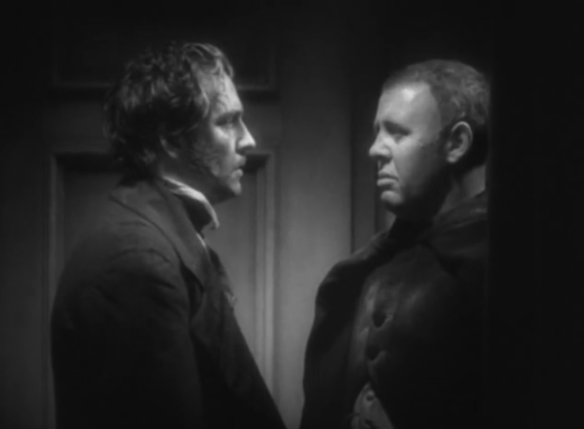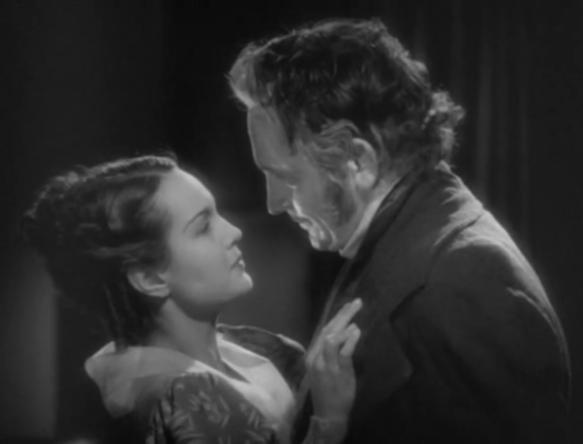
There’s a biblical verse that warns against storing up treasures in heaven where moth and rust destroy and where thieves break in a steal. Jean Valjean keeps two silver candlesticks with him always — they’re probably the nicest things he owns — but their true value signifies something more than worldly wealth.
While it cannot cope with the sheer scale and transcendent grandiloquence of Victor Hugo’s eponymous work, 20th Century Fox makes a valiant go at it using all the resources at its disposal to deliver the 1930s version of a prestige period piece.
Jean Valjean (Fredric March) is before the courts in the year 1800. The judge utters the purposefully grating words “guilty until proven innocent.” After all, the law is explicit. It makes no provisions for a man who stole out of desperation since he couldn’t get work with none to be found. His sister and nephew were starving. It makes no difference. Retribution is swift. 10 years in the galleys for his infraction.
Watching March in such abhorrent conditions is akin to any major movie star being forced to suffer so. Errol Flynn suffered a similar fate in Captain Blood. Charlton Heston and Kirk Douglas being enslaved years later also springs to mind. There’s a fortitude they earn in conjunction with the audience. It makes us commiserate with their lot in life — especially when the world seems so unfair.
Stylistically, the direction is a bit clunky with nothing particularly appealing with how Richard Boleslawski handles the material but given who he’s taking from, perhaps it’s for the best there are not many undue flourishes. Although artistic license is taken with innumerable details, the general essence of the novel (from what little I know) is still present, and, if anything, it has been shaped into a social piece to speak to the times.
But we have yet to speak of the story’s other crucial figure. Javert (Charles Laughton) is a devoted lawman with a sordid family history hanging over him. He’s trying to do everything in his power to get out from under its legacy.
There’s a recalcitrant timidity to Laughton even as he plays another fellow with power (like Captain Bligh) who is wholly beholden to the law. It becomes more and more apparent how relentless he is in his line of work — to the point of obsession and steep paranoia.
But make no mistake. He is no Captain Bligh. Laughton brings something of a different sort to him going beyond convenient descriptors. He’s merciless in another way with a deceptive even evasive cunning. And again you can’t help but feel sorry for the compulsive way in which he adheres to his duties. There’s something behind his eyes crying out even as his posture is always uncomfortable. Can we say he’s fragile? Somewhere in there is the little boy making amends for his parent’s failures. He’s part of the same legalistic system that put Jean Valjean into prison.
Here the candlesticks come back into play. The 10 years are up and after an escape attempt, our protagonist gets out of prison hardened and totally skeptical of the rehabilitation the government has in mind for him.
It’s not simply about there being no room; no one wants a scraggly social pariah like him in their establishment. He’s subsequently kicked out of every tavern and evey inn. It gets to the point that he sits in the pelting rain covering himself feebly against the elements. There’s one person he hasn’t tried and on some friendly advice, he seeks asylum with a local bishop (the quietly unperturbed Cedrick Hardwicke).
He soon is introduced to a kind of up-side-down radical generosity (involving the very same candlesticks), which feels so foolish by the world’s standards. And yet it makes people sit up and take note. For one, Valjean, who is a beneficiary, is blessed by charity in ways he’s never experienced in his life. It changes him, even melts his jaundiced attitudes. Angelic choruses are sung over triumphant imagery as Valjean takes on a firm resolve to change his life.
The movie makes it obvious. He literally becomes a new man — more like the well-groomed, charismatic Fredric March we typically know. He’s robed with a new character and from henceforward March wears the role quite regally going from forlorn criminal to man of the people, held in the highest regard. It’s not an altogether straightforward transformation, and he still manages it with relative ease.
Javert is his obvious foil. The two of them are incongruous. Valjean at his new post as mayor is forever dogged by the inspector’s unyielding ways. Yet again, justice cannot be tempered by mercy. If it’s not already obvious within the dramatic situation, Valjean’s own past must collide with Javert’s hound-like instinct.

As a charming background detail informing the film, March gets the opportunity to play across from his real-life spouse of many years Florence Eldridge. However, it is her cinematic daughter who is the other most integral piece. Cosette is a charming girl and an even more effervescent young woman (Rochelle Hudson). She makes her adopted father all the happier and fast becomes his most cherished treasure in the world.
The final sequence in this Les Mis is the first great show of period hubbub with gunfire, swords, horsemen, and smoke all conjoining on the screen. The youth movements have stirred up against the authoritarian forces of the status quo. It’s their fearless leader, Marius (John Beal), who is smitten with Cosette and vice versa. However, it never feels like a purely political story. We never hear the gory details of Napoleon or any of the trials and tribulations besetting Hugo himself for his outgoing stances.
It’s all about giving Valjean a stake in this cultural moment even as he and Javert must have their inevitable faceoff. First and foremost, it must be understood as a broader tale of sacrifice, forgiveness, and redemption. These are big words but then again, there are few books more deserving of such consideration.
It’s no wonder Valjean and Javert are archetypes unto themselves. One of sacrifice, the other of tragedy. The weight of the debt he owes — one he cannot repay — is far too much for Javert to bear. He takes a leap into the realm of Judas Iscariot as the story’s great catastrophe. Is he a villain? Aren’t we all?
The conceit at the center of this adaptation might be simplified, but it gets the theme across. Namely, it takes someone showing us the depths of grace and mercy for us to truly experience what radical love looks like. The law in all its nobility, justice, and truth will crush us under its weight. We cannot stand up against its regulations or else we’ll die trying. It’s best to realize our shortcomings and lend a generous hand to others.
Also, it gives a striking new meaning to candlesticks. They are no longer a blunt instrument with which to murder someone in the parlor. Instead, they are tokens, even tools, of redemption. Though only for some.
4/5 Stars

Beautifully written. First saw this when I was maybe six or seven, and was impressed even then.
LikeLiked by 1 person
Thank you! This was my first viewing. I’ll look forward to seeing it again in the future
LikeLike
Thank you so much for liking my first blog post! In perusing your blog, this post caught my attention. I adore Les Mis. To say it’s one of my favorite stories is an understatement. I was first introduced to it through the musical (by which I was so awed and inspired, it kick-started my love of musical theatre). And while I’ve yet to finish the novel itself, I appreciate each adaptation I’ve discovered so far – although this one somehow managed to escape me! (I will definitely be on the lookout for it.)
No matter how many times I revisit this story or one of its many adaptions / commentaries, it always touches my heart. It’s one of those special works that stands up to endless exploration and interpretation, and never fail to offer something new in return. With each personal touch by those whom it inspires, its depth only grows – and you have added to it through this piece.
I especially liked your thoughtful, empathetic perspective on Javert, who is far too complex and relatable to be simply dismissed as a “villain”. And I found your final paragraphs particularly moving. They sum up the theme of the story so well.
I took a look at your site, and I think you and I may be kindred spirits. I very much appreciate your inspired attitude toward films – and I look forward to following along, reading your posts, and exploring more movies with you!
LikeLiked by 1 person
Thank you for reading and your thoughtful comment! As I mentioned I’m definitely not as knowledgeable Les Mis fan as you, and I still haven’t read it but there was a lot in this adaptation I really appreciated. Laughton was quite interesting in how he portrayed Javert. I also look forward to discovering more films in the future. Happy viewing!
LikeLiked by 1 person